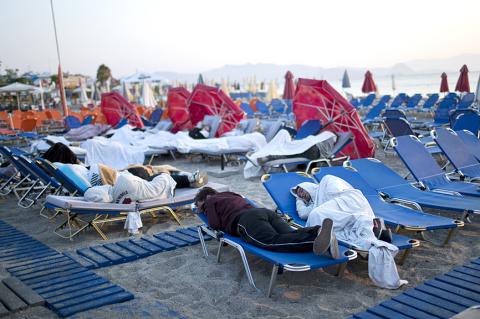Crews of experts on Saturday began examining the damage to cultural monuments and infrastructure on the eastern Greek island of Kos, one day after a powerful earthquake killed two tourists and injured nearly 500 others in the Aegean Sea region that stretches to Turkey’s sprawling coast.
Residents and tourists were still jittery as a series of aftershocks on Saturday night continued to rock the island.
A magnitude 4.4 tremor struck at 8:09pm on Saturday, sending residents and restaurant customers scurrying toward the middle of the town’s main square, as far away as possible from buildings. Sixteen minutes later, a magnitude 4.6 tremor struck, the Athens Geodynamics Institute reported.

Photo: AP
The first tremor had its epicenter only 20km northeast of Kos at a depth of 10km.
Hundreds of residents and tourists spent Friday night sleeping outdoors on the island, too afraid to return to their homes or hotels after the quake that struck early on Friday.
The aftershocks on Saturday night meant that many would spend a second night outdoors.
During the day in Kos, churches, an old mosque, the port’s 14th-century castle and other old buildings that suffered in the quake were being checked by archeologists and experts from Greek Ministry of Culture.
The island’s biggest infrastructure problem was the damage to the main port. Coast guard divers were on the scene inspecting the jetty, Kos Mayor Giorgos Kyritsis said.
“Life on the island is returning to normal,” Kyritsis said. “The infrastructure problems are being repaired.”
The mayor said Kos had not seen many tourist cancellations as a result of the quake.
“[Visitors] are touring the island with their tour guides. We don’t have a big problem. The ferry connection has been restored with the port of Kefalos and we are waiting as soon as possible to repair the damage at the port,” he said.
Life on the island had returned to its easy-going ways, gift shop owner Giannis Manoutkos said.
“Everything is normal now. The situation was bad for two days... We are coming to a normal life again,” he said.

The Ministry of Foreign Affairs (MOFA) yesterday said it is closely monitoring developments in Venezuela, and would continue to cooperate with democratic allies and work together for regional and global security, stability, and prosperity. The remarks came after the US on Saturday launched a series of airstrikes in Venezuela and kidnapped Venezuelan President Nicolas Maduro, who was later flown to New York along with his wife. The pair face US charges related to drug trafficking and alleged cooperation with gangs designated as terrorist organizations. Maduro has denied the allegations. The ministry said that it is closely monitoring the political and economic situation

Conflict with Taiwan could leave China with “massive economic disruption, catastrophic military losses, significant social unrest, and devastating sanctions,” a US think tank said in a report released on Monday. The German Marshall Fund released a report titled If China Attacks Taiwan: The Consequences for China of “Minor Conflict” and “Major War” Scenarios. The report details the “massive” economic, military, social and international costs to China in the event of a minor conflict or major war with Taiwan, estimating that the Chinese People’s Liberation Army (PLA) could sustain losses of more than half of its active-duty ground forces, including 100,000 troops. Understanding Chinese

UNRELENTING: China attempted cyberattacks on Taiwan’s critical infrastructure 2.63 million times per day last year, up from 1.23 million in 2023, the NSB said China’s cyberarmy has long engaged in cyberattacks against Taiwan’s critical infrastructure, employing diverse and evolving tactics, the National Security Bureau (NSB) said yesterday, adding that cyberattacks on critical energy infrastructure last year increased 10-fold compared with the previous year. The NSB yesterday released a report titled Analysis on China’s Cyber Threats to Taiwan’s Critical Infrastructure in 2025, outlining the number of cyberattacks, major tactics and hacker groups. Taiwan’s national intelligence community identified a large number of cybersecurity incidents last year, the bureau said in a statement. China’s cyberarmy last year launched an average of 2.63 million intrusion attempts per day targeting Taiwan’s critical

‘SLICING METHOD’: In the event of a blockade, the China Coast Guard would intercept Taiwanese ships while its navy would seek to deter foreign intervention China’s military drills around Taiwan this week signaled potential strategies to cut the nation off from energy supplies and foreign military assistance, a US think tank report said. The Chinese People’s Liberation Army (PLA) conducted what it called “Justice Mission 2025” exercises from Monday to Tuesday in five maritime zones and airspace around Taiwan, calling them a warning to “Taiwanese independence” forces. In a report released on Wednesday, the Institute for the Study of War said the exercises effectively simulated blocking shipping routes to major port cities, including Kaohsiung, Keelung and Hualien. Taiwan would be highly vulnerable under such a blockade, because it